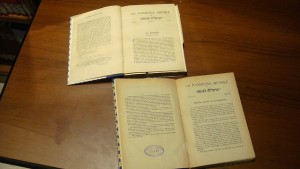CULTURE New Life for a Glorious Jewish Italian Magazine
For the Rassegna Mensile d’Israel, a magazine focused on the cultural and social evolution of Italian Jewry, it was time for a change.
The editor-in-chief Giacomo Saban has left his job. “This monthly magazine was started in 1925, just one year before I was born. It seems obvious to me at this point that I should leave my position to a younger person,” he wrote.
A new committee of Jewish scholars was formed: Alberto Cavaglion, rabbi Gianfranco Di Segni, Angelo Piattelli, Myriam Silvera and Laura Quercioli Mincer. They will be in charge of editing the new magazine. The Rassegna will also have an Israeli committee coordinated by Angelo Piattelli with Paola Abbina, Alfredo Mordechai Rabello, Ariel Rathaus and Claudia Rosenzweig, all being scholars of Italian origin.
The goals of the magazine are to inform about the developments of Italian Judaism throughout the world and to create a strong relationship between Israeli and Italian Jews. Giacomo Saban is a former president of the Jewish Community of Rome (in 1986 it was he who welcomed the Pope to the Rome Synagogue for the first time). He had also been vice-president of the Union of Italian Jewish Communities. The two last issues of the magazine, currently in distribution, mark the big change.
The first issue is dedicated to three great rabbis of Rome in the twentieth century; Rabbi Vittorio Castiglioni (1840-1911), Rabbi Angelo Sacerdoti (1886-1935) and Rabbi David Prato (1882-1951) and it was edited by Rabbi Gianfranco Di Segni and Laura Quercioli Mincer.
“I was interested in highlighting their international outlook. For example, Rabbi Sacerdoti when head of the Rabbinical College had received a letter (previously unpublished and rediscovered in the community archives), from the young Abraham Yehoshua Heschel applying for a teaching position in Rome. The letter was sent only three months before Rabbi Sacerdoti’s death. It does however continue to be an important source of understanding about how the Rabbinical College in Rome was considered in Jewish Europe.”
The second issue covers several topics. It contains an essay by Rabbi Abraham Alberto Piattelli on “l’amuleto veneziano” (“A Venetian amulet”) a fragment of parchment that maybe had been a cabalistic qemia to save Venetian Jews during the Napoleonic period as well as Russian stories by Sholem Aleichem introduced by Roberta De Giorgi.
“In the updated magazine we will try to be modern, to give space to Italian and international Jewish culture and to dedicate several pages to debate,” promises Laura Quercioli Mincer.

